Add this eBook to your basket to receive access to all 307 records. Our indexes include entries for the spelling molesworth. In the period you have requested, we have the following 307 records (displaying 161 to 170): These sample scans are from the original record. You will get scans of the full pages or articles where the surname you searched for has been found. Your web browser may prevent the sample windows from opening; in this case please change your browser settings to allow pop-up windows from this site. Deaths, Marriages, News and Promotions
(1845)
Death notices and obituaries, marriage and birth notices, civil and military promotions, clerical preferments and domestic occurrences, as reported in the Gentleman's Magazine. Mostly from England and Wales, but items from Ireland, Scotland and abroad.
| Sample scan, click to enlarge

| Graduates of Cambridge University
(1760-1846)
Joseph Romilly, registrar of the university of Cambridge, compiled Graduati Cantabrigienses, a catalogue of graduates from the academic year of admissions 1760 through to 10 October 1846. The names are arranged alphabetically by surname, and then chronologically by christian name: the college is given, with an asterisk in those cases where the man became a fellow, and then, in chronological order, his degrees. | Sample scan, click to enlarge
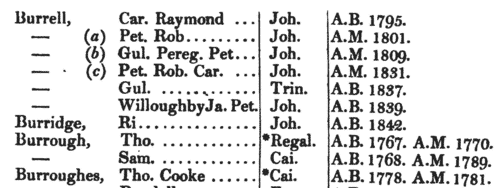
| The Edinburgh Gazette
(1846)
The Edinburgh Gazette is the official publication in which various Scottish legal notices are issued, as well as promotions and casualty lists for the British army as a whole, and brief lists of English bankrupts. The key source for tracing details of Scottish bankruptcies, insolvencies, and dissolutions of business partnerships. | Sample scan, click to enlarge
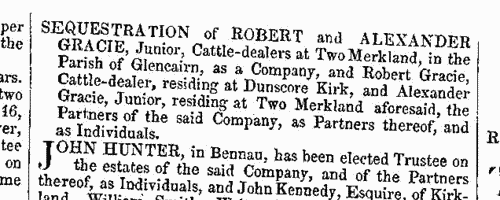
| Deaths, Marriages, News and Promotions
(1847)
Death notices and obituaries, marriage and birth notices, civil and military promotions, clerical preferments and domestic occurrences, as reported in the Gentleman's Magazine. Mostly from England and Wales, but items from Ireland, Scotland and abroad. January to June 1847
| Sample scan, click to enlarge
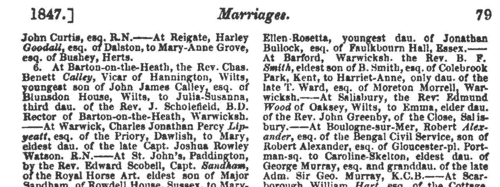
| Deaths, Marriages, News and Promotions
(1847)
Death notices and obituaries, marriage and birth notices, civil and military promotions, clerical preferments and domestic occurrences, as reported in the Gentleman's Magazine. Mostly from England and Wales, but items from Ireland, Scotland and abroad. July to December 1847
| Sample scan, click to enlarge

| Dissolutions of partnerships in England and Wales
(1847)
Perry's Bankrupt and Insolvent Gazette, issued monthly, included lists of dissolutions of partnerships gazetted in England and Wales. The names of the partners are given in full, surnames in capitals, followed by trade and address, and date of the end of the partnership. Each entry usually ends with the phrase 'Debts by ...', indicating which partner intended to continue, and resume the responsibilities of, the business. This is the index to the names of the partners, from the issues from January to December 1847. | Sample scan, click to enlarge

| Bankrupts' Assignments
(1848)
Assignments of bankrupts' estates (usually to principal creditors and/or close relatives of the bankrupt) in England and Wales | Sample scan, click to enlarge

| Bankrupts' Estates
(1848)
Bankrupts' estates for England and Wales vested in assignees: bankruptcy often caused people to restart their lives elsewhere, so these are an important source for lost links
| Sample scan, click to enlarge

| Electors for Quick
(1848)
On 14 and 15 December 1848 an election took place for a Knight of the Shire for the West Riding of Yorkshire in the House of Commons. The candidates were Edmund Denison and sir Culling Eardley Eardley, gaining 14,743 and 11,795 votes respectively. The county franchise at this period included freeholders of land worth 40s or more a year; £10 copyholders and long-leaseholders; and £50 short-leaseholders and tenants. This poll book was published in 1849.
Former poll books had been compiled from the sheriff's returns; but as these were now transmitted to the Home Office immediately after an election, in this instance the polling was marked from the check-clerk's returns, carefully compared with the registers marked in the poll booths at the time of voting.
The votes for the respective candidates are indicated by the numerals 1 (Denison) and 2 (Eardley). The omission of these numerals indicates that the elector did not vote. Many names which appear on the register of particular townships are completely omitted in this poll book: in all these cases, the same name will be found recorded in some other township, the elector having two or more qualifications. In such cases, his name only appears in the poll book in the actual township for which he chose to vote; or, if he did not vote at all, in that township for which he was qualified that lay closest to his actual residence.
The townships are arranged alphabetically within polling district; and within each township the names are arranged alphabetically by surname and christian name, and the elector's residence is given. Many of the electors resided outside the township for which they were qualified - some in other counties. Moreover, at the end of each polling district there is a list of persons registered to poll in that district, from townships is other districts. | Sample scan, click to enlarge
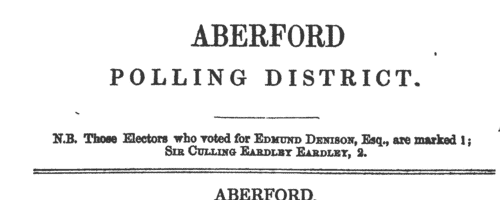
| Boys entering Rugby School
(1849)
This edition of Rugby School Register was published in 1933: the volume covering 1675 to 1857 contains 6480 entries, based on the original school admission registers, but elaborated with general biographical information wherever the editor was able to do so. The entries for the 17th and early 18th centuries are much less detailed than those for later years. The arrangement of the fullest entries was to give the boy's full name (surname first, in bold); whether eldest, second, &c., son; father's name and address as of when the boy entered school; the boy's age at entry and birthday; name of the house (in the school) to which he belonged; then a brief general biography; and date and place of death. | Sample scan, click to enlarge
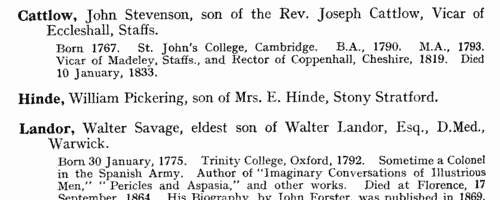
|
Research your ancestry, family history, genealogy and one-name study by direct access to original records and archives indexed by surname.
|











